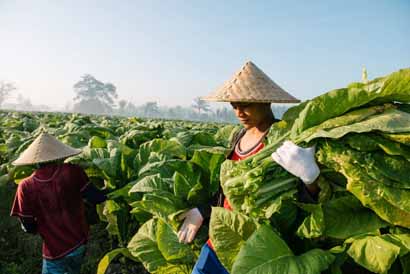While it has been more than six months since Vietnam agreed to waive import duties on 3,000 tons of Cambodian exports of unmanufactured tobacco, smallholder tobacco growers claim the agreement has done little to improve their incomes, according to a story in The Phnom Penh Post
Some growers have accused big tobacco companies of hoarding all the profits from these transactions.
The tobacco-duty exemption came as part of a bilateral trade agreement signed in October that gave preferential treatment to 39 export items from Cambodia and 29 items from Vietnam. Under the deal, Cambodian tobacco producers could apply for licenses to export up to 3,000 tons of unmanufactured tobacco a year to Vietnam duty-free in 2016 and 2017.
The agreement was widely expected to stimulate exports, with smallholder farmers benefiting from higher prices created by the demand from traders looking to fill the quota.
However, Som Ra, head of the Krouch Chhmar district agricultural office in Tbong Khmum province, said tobacco prices had remained stable since the quota deal, and he questioned whether anybody had actually benefitted from it.
“If a deal for 3,000 tons to Vietnam existed, I would expect prices to rise and more competition in the market, but so far nothing has changed from the Vietnamese side,” he said.
He added that most tobacco farmers in his district were selling their tobacco to British American Tobacco (BAT) or Chinese dealers.
Meanwhile, Chhin Buntheourn, a smallholder tobacco farmer in the Kong Meas district of Kampong Cham province, said he was disappointed that the quota deal had done little to improve his income.
“I initially expected that the price of tobacco would increase, but until now we continue to struggle with the same low price,” he said, adding that the market rate for tobacco had remained unchanged at between 300 and 400 riel per kg.
Buntheourn said he suspected that large tobacco firms had obtained the export permits but were not passing along any of the profits to smallholder farmers.
“The bilateral agreement only benefits the big companies and has not offered any better price for us,” he said.
Chhay Sokhon, who cultivates tobacco on his 2.5 ha farm in Krouch Chhmar district in Tbong Khmum province, expressed a similar sentiment, adding that market prices were dictated by “smooth-talking traders”.
“When I heard the news I expected that I would receive a good price this year for my crop, but nothing has changed,” he said. “Any fluctuation in the price is the result of bargaining.”
Kim Sarourn, director of Kampong Cham’s Provincial Agriculture Department, said farmers saw better yields this year, but that the agreement had done little to open new markets.
“I haven’t heard of any new markets,” he said. “Demand from the Vietnamese side remains the same and there is really only BAT contracting with farmers.”
Almost all tobacco grown in Cambodia is cultivated in the adjacent provinces of Kampong Cham and Tbong Khmum.
The provinces have about 5,000 ha and 1,000 ha of tobacco under cultivation, respectively, yielding on average 1.5 tons per ha.

